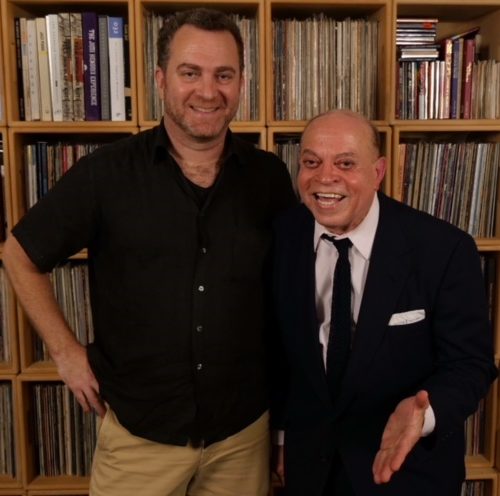
Ric Stewart with Deacon John (photo provided by: Ric Stewart)
Thanks to its rightful reputation as the birthplace of jazz, New Orleans’ contributions to the development of the blues can sometimes go overlooked.
“Some of the great blues people have emerged from here,” says Ric Stewart, a professor, deejay, producer and blues devotee. “In the beginning, jazz and blues were very much together. Buddy Bolden’s songs really played the blues and used that in the names of the songs.”
And it continued with musicians like Lonnie Johnson and Champion Jack Dupree, “people we don’t perceive of as being in the genre who were very blues-y,” Stewart says. “Fats Domino or Professor Longhair had a very deep sort of blues understanding, and that had been their earlier style.”
And recent research has uncovered that the first published 12-bar blues song was ‘I got the Blues’ by Anthony Maggio, a Sicilian immigrant to New Orleans who was trained in opera,” says Stewart.
That this is based on recent research illustrates just how much blues history is yet to be uncovered. “Most of these topics are like scholarly debates at this point,” says Stewart. “There isn’t much known about what happened in the 1800’s because of the lack of recordings and the distance between the people who were creating the music in the fields and the publishing side of the music business.”
While there was written music back then, “it didn’t tend to focus on the folk music, and especially that of African-Americans,” he says.
Even defining the blues can be difficult. “There are so many different places the blues has appeared and different definitions people apply to it,” says Stewart.
“It’s both a musical form which is characterized by the flatted notes, the call and response, the blues scale, and that permeates other genres, so it’s confusing already.
Stewart describes “flatted notes” as a way of bending a note and getting a human voice similar to a moan or something that really carries a significant emotional impact that was often lacking in European music. “That’s the piece that is said to come from Africa and in the Afro-American experience in the work songs, and that got filtered back into the music, and it went on from there.”
There are also a lot of preconceptions about the genre. “A lot of people like to stereotype blues as not being upbeat or [as] being mournful,” Stewart says, but that’s an oversimplification. Stewart says there are many happier blues tunes out there, and he once did an entire radio special of happy blues songs while deejaying at WTUL.
He points to “jump blues.” “There was a whole era like that,” he says. “Louis Jordan, and that led very directly to Chuck Berry – you could really say he’s kind of a blues artist as well, very upbeat and fun material. And I think a lot of these songs are also cathartic, and so they start off being something that seems like it’s a downer, but when you work your way through that, it kind of lifts the spirit.”
And then there are the blues as they exist beyond just the music, Stewart says, “in comedy and lifestyle and just almost everything else, so it’s ever-expanding.”
Stewart is hoping to bring all of it – or as much as he can – under one roof, at what he is calling The Blues Center, a building where “we lay it all out on a platter.”
Stewart envisions a center for both education and entertainment, and of course, he wants to do it here. “The tri-centennial of New Orleans is 2018, and I think it’s still possible,” he says, “so I’m out there doing the fundraising and pitching the idea a little bit.”
Until the Blues Center comes to fruition, Stewart continues producing a web series where he interviews blues greats like Stanton Moore or Little Freddie King. Those interviews are available on Youtube and at www.bluescenter.com.
 NOLAbeings Multimedia artist Claire Bangser created NOLAbeings as a portrait-based story project that marries...
NOLAbeings Multimedia artist Claire Bangser created NOLAbeings as a portrait-based story project that marries...  Voodoo in New Orleans: Reviving history: New Orleans fortune telling This article takes a deep dive into the history of Voodoo in New Orleans, its hybridization with Catholicism, and its present-day place in the city's culture. The author visits fortune-tellers in the French Quarter, using their guidance as a tool for introspection rather than a deterministic predictor of the future. Through her experiences in New Orleans, the author feels a mystical connection to both the past and the future.
Voodoo in New Orleans: Reviving history: New Orleans fortune telling This article takes a deep dive into the history of Voodoo in New Orleans, its hybridization with Catholicism, and its present-day place in the city's culture. The author visits fortune-tellers in the French Quarter, using their guidance as a tool for introspection rather than a deterministic predictor of the future. Through her experiences in New Orleans, the author feels a mystical connection to both the past and the future. 